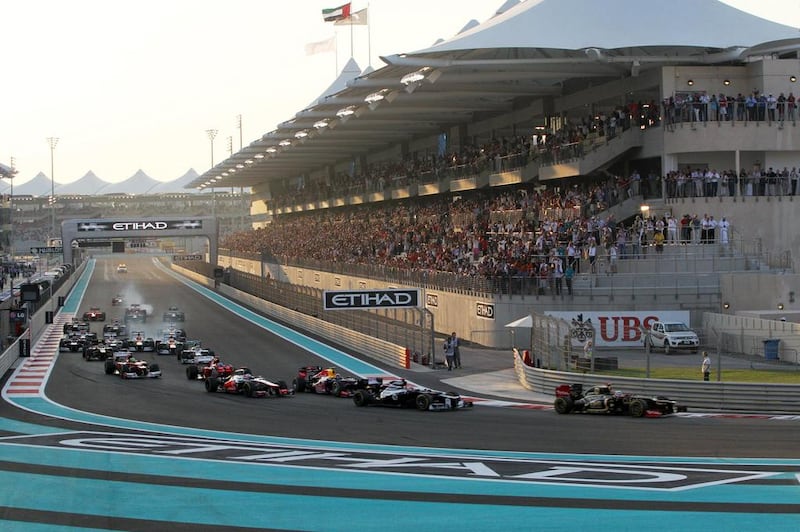For the eighth year running, the UAE capital is home to the glitziest motor racing event in the world as the fans, drivers and teams arrive for Etihad Abu Dhabi Formula One Grand Prix.
But what does the city gain from hosting a F1 Grand Prix?
It obviously receives the gate receipts and the number of paying customers has been increased to in excess of 60,000 this year.
Of course, it also has to host a series of international star concerts that are part of the F1 package – the star power of this year’s headline act Rihanna and previous headliners, Beyonce and Eminem, does not come cheap. And, Hello! Even golden oldie Lionel Richie will charge a pretty penny for his performance.
So it is little surprise the tickets are not cheap. Prices run from around US$600 for a two-day pass to the Marina Grandstand to $5,400 for a three-day ticket to the Paddock Club with the concerts included.
Abu Dhabi’s purpose-built Yas Marina track and Yas Viceroy Hotel that cost an estimated $1.5 billion to construct. That is a lot of concerts and expensive ticket packages to sell to recoup such an investment.
“This is our week and we charge accordingly,” says Mark Griffiths, the managing director of Yas Viceroy Hotel.
He says it is not just the F1 weekend that promotes the bottom line, the event is a platform for the hotel to sell MICE packages and events around the racetrack for the rest of the year.
“For the race weekend our rates probably go up to eight times the normal.
“Because we are the only hotel in the world built on an F1 track we will have 100 per cent occupancy for the race weekend, which is Thursday to Sunday, and all our food and beverage outlets will be at near capacity.
“I think the worldwide attention and just the name Abu Dhabi being constantly mentioned as the final race looms brings about global cognisance that is very hard to price.”
The global presence and profile of Abu Dhabi has increased exponentially since it began hosting the Grand Prix in 2009. Much like how Formula 1’s Red Bull team has banked on its name recognition, branding and alliance with the sport’s core values – speed, technology, bravery, modernity – so do the cities that host the Grand Prix.
“There is a halo effect of being associated with a sport that has true global appeal,” says Donal Kilalea, the chief executive of Promoseven Sports Marketing in Dubai.
“It is difficult to specifically state the economic benefits versus the investment. However, as a marketing tool its benefits are clear with the eyes of the world watching your city.”
Rashid Aboobacker, a Dubai-based associate director at TRI consulting, adds: “The F1 event is an important tourist attraction for Abu Dhabi. It attracts tens of thousands of visitors to the city every year.
“However, more importantly, the event has helped position the city firmly on the international tourism map alongside many other sought after tourist destinations where the races are held each year, and continue to act as a strong marketing tool.
“We do not have official figures from ADTCA [Abu Dhabi Tourism & Culture Authority] regarding the revenues generated by the event,” Mr Aboobacker says, adding, “Hotel occupancy in Abu Dhabi was 83 per cent in November 2015 compared to 75.4 per cent for the full year.
“Hotels in Yas Island and in the city also leverage the heightened demand to host events and generate significant F&B revenues during this period.”
The trickle down effect of the event is a marked one, not just for hotel stays but for the F&B opportunities that surround it.
“Apart from our rates, which are 20 to 30 per cent higher for the week of the event, we have many F&B opportunities,” says Dulce Ortega, the director of sales and marketing for the Armed Forces Officers Club and Hotel in Abu Dhabi.
“We provide the VIP catering at the track across six different outlets.
“While the event offers a short-term boost to business, it puts Abu Dhabi on the map as a destination. It brings huge acts and an international focus – I think it is very clever marketing. Abu Dhabi is more about business than Dubai and F1 meets that business eye.”
But Formula 1 is a strange beast. It is a sport watched by a global audience of about half a billion people with eyeballs and attention that straddles the planet from Asia to the Americas.
Tracks will pay up to, and beyond, Dh210 million just to host one race with a typical contract for five years that includes a 10 per cent inflation clause built in every year.
Bahrain was the first Middle East country to host a Grand Prix in 2004 and has seen a return of about $1bn since then, according to Sheikh Salman Bin Isa Al Khalifa, the chief executive of the Bahrain International Circuit.
Race tracks generally do not get any revenue from the television broadcasts of a Grand Prix or from F1’s corporate hospitality and trackside advertising. This money goes to the sport’s rights-holder the F1 Group and the tracks are left to survive on ticket sales alone.
F1 knows how to make money.
Monaco’s Monte Carlo is the only “track” (it is a road race) that does not pay for the privilege – its racing history, glamour, decadence and celebrity soaked importance to Formula 1 has assured it a place that even F1 cannot tax.
It is the kind of reputation Abu Dhabi’s Yas Marina circuit would love to emulate in future.
ascott@thenational.ae







